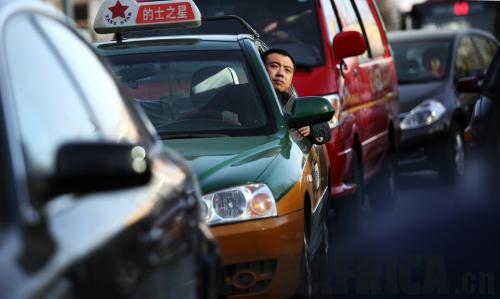|
 |
|
WAN XIANG |
Controlling Traffic Chaos
Beijing residents now need to apply to buy a car as new regulations, effective from January 1, became part of a series of new polices to curb mounting traffic chaos. Other regulations include limited automobile registration and increased parking charges. According to the regulations issued by Beijing Municipal Commission of Transport, the city will license only 240,000 new vehicles in 2011, a third of the 700,000 new autos that hit Beijing roads in 2010. Eighty-eight percent of the quota will be distributed among first-time private buyers, who have to apply for the license plates via a lottery system. Only permanent residents of Beijing, as well as those serving in the police and military, are eligible to apply for license plates. In addition, parking time within the fifth ring road (Beijing is composed of concentric roads that stretch out from the city center) will be charged on a 15-minute-base rather than the previous 30 minutes, while parking fees in the city will rise from 2 yuan ($0.3) to 10 yuan ($1.5) per hour within the third ring road.
Hainan Offers Tax Rebates
From January 1, foreign tourists can claim tax rebate at 11 percent of their consumption amount in China's southern Hainan Province, according to the Ministry of Finance. Foreigners and Hong Kong, Macao and Taiwan residents who spend less than 183 days in Hainan are eligible for the tax rebate, as long as they spend a minimum 800-yuan ($120.88). They can choose how the tax is refunded (cash or bank transfer) and refund currency (RMB or other major international currencies). "The tax preferential policy aims to stimulate tourism and consumption in the region and build Hainan Island into an international booming tourist resort," said Lu Yong, Vice Director of Hainan Provincial Finance Bureau.
Combating Trade Surplus
China will issue a new series of rules and policies to promote imports and overseas investment by domestic companies in 2011, to release the mounting pressure caused by China's huge trade surplus, as evidenced by the Ministry of Commerce (MOFCOM) in the recent national work meeting in Beijing. Major policies aimed at encouraging contracting projects abroad, conducting labor cooperation with foreign countries and investing overseas are expected to be enforced during 2011, according to sources from the MOFCOM. Zhang Ji, Director of MOFCOM's Mechanic, Electronic and Hi-Tech Industry Department, told the meeting that five industrial measures including simplifying trade procedure, holding products exhibitions, urging foreign countries to loosen export controls on China and motivating innovation and financing will be taken to propel imports of mechanical and electrical products, which make up almost half of China's imports.
Small Car Tax Favor Ends
From January 1, 2011, purchase tax for small passenger cars with engines of 1.6 liters or less will return to 10 percent from the 7.5 percent put in place in 2010, according to a recent document jointly issued by the Ministry of Finance and the State Administration of Taxation. The tax rate change is the second hike since it was lifted from 5 percent, implemented in 2009 and expired at the end of that year. The special rate was aimed to boost plunging auto sales in that year and encourage fuel emission reduction. Experts view the subsidy withdrawal as timely and conducive to the industry's long-term development. "Despite a temporary impact on small-car purchase, the policy guides auto manufacturers to develop cleaner and more energy-efficient cars in the future," said Zhang Zhiyong, a senior commentator on auto industry.
Controlling Dairy Products
Domestic dairy importers are requested to recall their unsafe products, which have caused or may incur health problems to consumers. This was proposed in the latest regulation draft from the General Administration of Quality Supervision, Inspection and Quarantine (AQSIQ). The draft noted that in cases where sellers failed to recall their products, related quality supervision agencies should recall the products and report to the AQSIQ, which will issue risk warnings and prevent any further crisis. For safety reasons, countries and regions exporting raw milk to China for the first time must supply information about health laws, veterinary services, safety and sanitation controls, and residue and animal disease monitoring. For those exporting other dairy products to China for the first time, information on raw material sources, production and processing techniques and the use of ingredients and additive is required. The regulation doesn't apply to cross-border dairy products transported via express packages or mail, or those carried by passengers. |